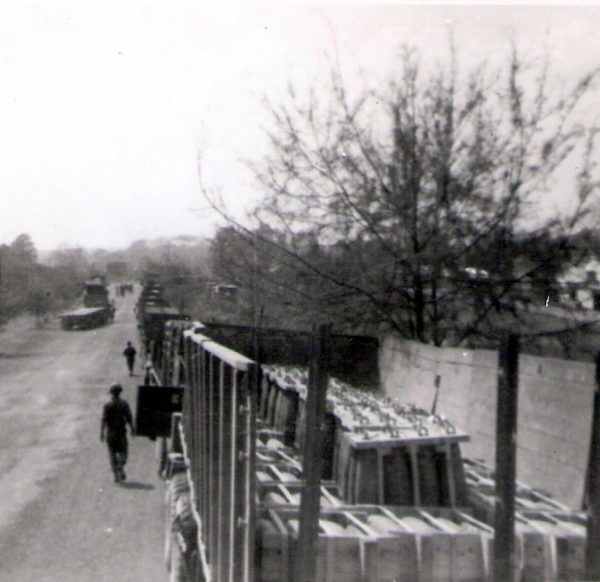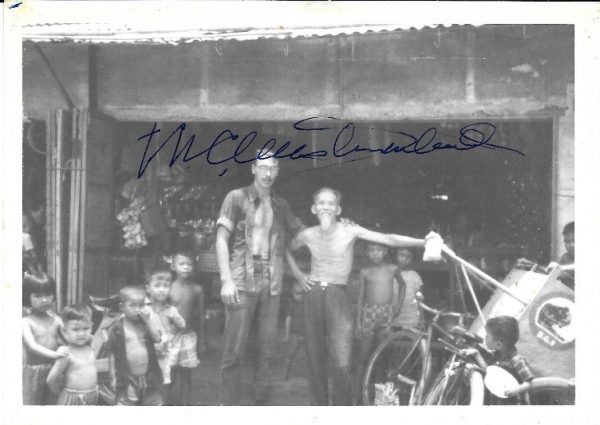In March of 1967, I was a 19-year-old serving my country in Vietnam. I was six months into my tour of duty. I was stationed in Long Binh with the 48th Group. While my MOS was that of a Heavy Vehicle Operator, I spent most of my time pulling Guard Duty on the perimeter of the camp. At times, I would be assigned to Guard Duty at the Ammo Dump outside of Ben Hoa.
By mid-March 1967 Operation Junction City had been in operation for about a month.
A simple explanation of the objective of Operation Junction City was to clear an area in Tay Ninh Province, referred to as War Zone C, of the Viet Cong and North Vietnamese Regulars.
During the middle of March 1967 assignments were being made to haul badly needed supplies from the Saigon area to War Zone C. The operation required a Driver and “Shotgun” (front passenger) for each and every vehicle. The supply support operation was considered to be “close support” since the convoys would be traveling through hostile territory to get to the supply dumps.
 I had volunteered to ride shotgun on one of the vehicles on this one occasion. Somewhere near our destination on a red clay road, that the driver could hardly see the vehicle in front of him, one of the vehicles took a wrong turn. This wrong turn took the remainder of the convoy, including the vehicle I was riding in toward the Cambodian border and into Cambodia. Needless to say, we were lost.
I had volunteered to ride shotgun on one of the vehicles on this one occasion. Somewhere near our destination on a red clay road, that the driver could hardly see the vehicle in front of him, one of the vehicles took a wrong turn. This wrong turn took the remainder of the convoy, including the vehicle I was riding in toward the Cambodian border and into Cambodia. Needless to say, we were lost.
At the time that we determined a sense of where we were in reference to the Base Camp, where we were supposed to be, the darkness of night had set in and we were somewhere near or in Cambodia.
Without going into a lot of detail about how long we were missing I’ll just say it was at a much, much later time that we found our way to the Base Camp.
I remember that during the trip back the vehicle that I was riding in had a problem with the trailer breaks locking up. The truck was actually dragging the trailer.
I also remember telling the driver to get out of the truck and stand guard until we figured out how to get the trailer breaks unlocked. I finally realized that the trailer breaks would unlocked by draining the air tanks on the trailer.
 Upon return to the Base Camp we were informed by an officer that we had been given up for dead due to the hostile activity that was and had been occurring in the area. We were believed to be lost. We were told that we were completely on our own and that no one would have been sent out to look for us.
Upon return to the Base Camp we were informed by an officer that we had been given up for dead due to the hostile activity that was and had been occurring in the area. We were believed to be lost. We were told that we were completely on our own and that no one would have been sent out to look for us.
This was later confirmed when a friend of mine informed me that he had volunteered to be part of a search team in an effort to locate us. I was also informed that he was told that there would be no search effort which verified the officer’s comments.
That night Charlie decided to test the Camp Security, probing all around the camp for weakness and an entrance into the Camp. The attack was repelled.
If I didn’t return home, would anyone remember me?
It was after these events and a few others that happened when I started to think for the first time that something could happen and maybe I would not be going home. You see up to this point there was never any doubt in my mind that I would be going home at the end of my tour of duty in Vietnam.
My thoughts during this time were: would anyone, other than my family, know that I was here and if I didn’t return home, would anyone remember me?
At the beginning of 2015, some 48 years later, the memory of those thoughts were the inspiration for my initiative to have a National Vietnam Veterans Day of Recognition established by the United States Congress. I never wanted anyone to ever forget about the service and sacrifice that those who served their country in the Vietnam War to ever be forgotten.
It was my opinion that the best way to prevent this was to establish a national day by Congress to recognize all the men and women who served in Vietnam and those that sacrificed their life in an unpopular war that so many Americans and Congress for a long period of time wanted to forget.
 It would recognize the many who today still relive the war with their experience, images and memories.
It would recognize the many who today still relive the war with their experience, images and memories.
It would provide additional recognition of the family members who stood by and cared for those that returned home and today still suffer both mental and physical wounds of the war.
On March 28, 2017, after 27 months of a daily effort to have a National Vietnam Veterans Day of Recognition established by the United States Congress, President Trump signed S. 305 into Public Law 115-5.


